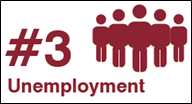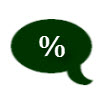Many direct and indirect economic market factors play a role in the movement of interest rates. Generally, in a growing economy, people have a higher confidence level to borrow and spend causing rates to increase. In a slowing or recessionary environment however, rates tend to go down due to the uncertainty. As a practical example, in a growing economy, people will be more likely to buy a house, a car, major appliances etc versus in an uncertain economy, people will have a tendency to save or hold on to their money. When it comes to forecasting mortgage rates, one can’t perfectly predict where they will trade, however, with a little bit of understanding anyone can capitalize on the market movements, if they know where and when to look.
Economic Growth
The GDP Report is the most prominent measure of the state of the economy. When GDP rises it typically means that the economy is expanding, and therefore interest rates would be likely to increase. Conversely, when GDP or other leading market indicators show a slow-down in production or growth, it often means the economy is contracting, and interest rates may start to decline.
Inflation
Inflation is another important factor that drives the direction of interest rates. Lenders will demand higher rates as compensation for the decrease in ‘purchasing power’ of the money they will be repaid in the future in a high inflationary environment. A stable and predictable inflation level is crucial for the economy, and is one of the most important gauges that the Federal Reserve  uses to help it monitor their policies.
uses to help it monitor their policies.
Unemployment
The rate of unemployment represents the total number of U.S. paid workers. If more jobs are created than expected, investments tend to shift from Bonds to Stocks, pushing interest rates higher. It is important to pay attention to seasonal employment numbers in payroll because it can skew the results without a real significant economic change.
Similarly, if the number of people filing first-time claims for state unemployment insurance increases, this indicates weakness in this market  which influences rates in the other direction.
which influences rates in the other direction.
Geopolitical Events
With the increasing globalization of the world over last few years, the economic conditions of international markets and environments have started playing an important role in interest rate movement. When a negative geopolitical event occurs, tensions rise globally, and investors look for less risky investments. More than likely money is going to flow into stable securities like U.S. Treasuries and Bonds in order to provide a short-term safe haven for investments. This will help rates to go down. It’s hard to fathom the billions of dollars that move from Stocks to Bonds during geopolitical events which can cause lots of volatility – and opportunity.

If you are in the market for a loan, understanding the key reasons for these changes and differences can help you get a lower rate and save a lot of money in the long run. Naturally, most people don’t have the time or patience to monitor all of the intricacies of moving rates, and should rely on a competent and knowledgeable professional. For the best idea of where rates are now and where they might be going in the short term, please reach out for a no obligation confidential consultation.
Shmuel Shayowitz (NMLS#19871) is President and Chief Lending Officer at Approved Funding, a privately held local mortgage banker and direct lender. Approved Funding is a mortgage company offering competitive interest rates as well specialty niche programs on all types of Residential and Commercial properties. Shmuel has over 20 years of industry experience including licenses and certifications as certified mortgage underwriter, residential review appraiser, licensed real estate agent, and direct FHA specialized underwriter. He can be reached via email at Shmuel@approvedfunding.com.

















